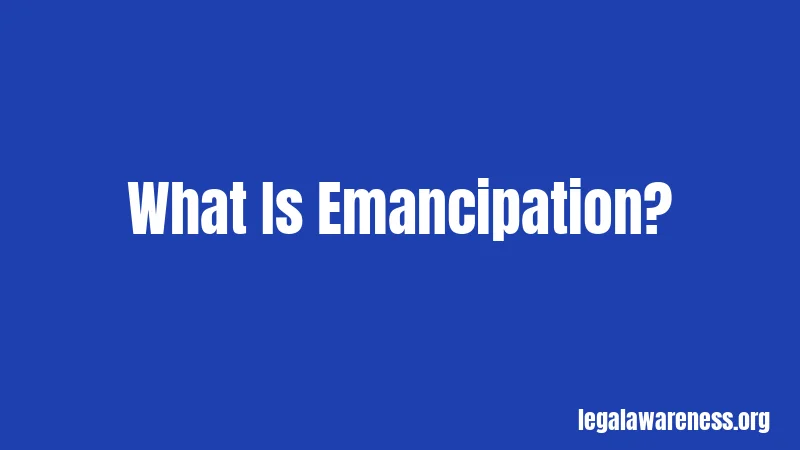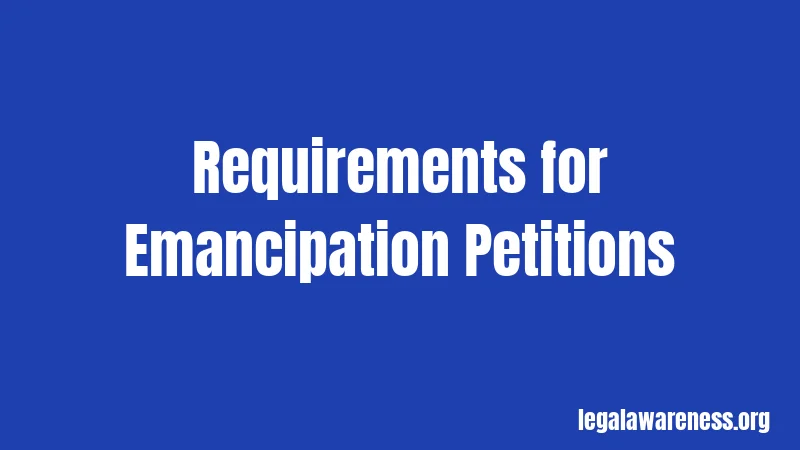Emancipation Laws in Florida (2026): Everything You Need to Know
Emancipation gives minors the legal rights of adults before they turn 18. In Florida, this process can help teens gain independence from their parents. This guide explains how emancipation works in Florida and what you need to know.
Learning about emancipation laws is important for families facing difficult situations. This article covers the legal requirements, costs, and consequences of emancipation in Florida.
What Is Emancipation?

Emancipation is the legal process that removes the “disabilities of nonage” for minors. This means a minor gains most of the rights and responsibilities of an adult. The term comes from Florida law and essentially means freedom from parental control.
An emancipated minor can control their own affairs. They can make decisions without asking their parents. They can sign contracts, get medical care, and handle their own money.
Emancipation is permanent. Once a court grants it, the minor cannot go back to being under their parents’ care. This makes it a serious legal decision.
Basic Emancipation Laws in Florida
Age Requirements
A minor must be at least 16 years old to seek emancipation in Florida. Anyone younger than 16 cannot be emancipated through the court system. The minor must also live in Florida when they file their petition.
Florida follows this age rule strictly. Courts will not consider emancipation petitions from anyone under 16 years old.
Who Can File for Emancipation
The minor cannot file for emancipation themselves. Only their parents, legal guardian, or a court-appointed guardian ad litem can file the petition. This rule exists because minors legally cannot represent themselves in court.
If parents disagree about emancipation, only one parent needs to file the petition. However, the other parent must be notified of the court proceedings.
Requirements for Emancipation Petitions

Information Required in Petition
The petition must include specific information about the minor. This includes their name, address, and birth date. It must also list the parents’ names and addresses.
The petition needs details about the minor’s character, habits, and education. It must explain the minor’s income and business abilities. Most importantly, it must show how the minor will meet basic needs like food, shelter, and medical care.
The petition must explain why emancipation would be good for the minor. This explanation is crucial for the court’s decision.
Financial Requirements
The court focuses heavily on the minor’s ability to support themselves financially. The minor must prove they can pay for housing, food, clothing, and other basic needs without help.
Courts want to see steady income or savings. They need proof the minor can handle money responsibly. Simply having a part-time job usually is not enough.
Court Process and Procedures
Filing Requirements
The filing fee for emancipation is approximately $301. This fee must be paid to the Clerk of Court when filing the petition. Fees may vary slightly between counties, so check with your local court.
Some courts may waive fees for families who cannot afford them. You must ask the court and prove financial hardship.
Legal Representation
When parents file for emancipation, the court must appoint an attorney ad litem for the minor. This lawyer represents only the minor’s interests, not the parents.
The attorney ad litem helps protect the minor during the court process. They make sure the minor understands what emancipation means.
Notice Requirements
If only one parent files the petition, the other parent must receive legal notice. This happens through official service of process. The court wants to make sure both parents know about the emancipation request.
If a guardian ad litem files the petition, both parents must be notified. The court takes these notice requirements seriously.
Court Hearing and Decision

What Courts Consider
The court’s main concern is whether emancipation serves the minor’s best interests. Judges consider the minor’s maturity level, financial ability, and reasons for seeking emancipation.
Courts look closely at the minor’s ability to handle their own affairs. They want to see evidence of responsibility and good decision-making.
The minor must attend the court hearing. The judge may ask questions about their plans and ability to live independently.
Evidence Needed
Courts want proof of financial stability. This might include bank statements, employment records, or contracts. The minor needs to show they can pay rent, buy food, and handle emergencies.
Educational plans matter too. Courts prefer minors who plan to finish high school or pursue further education.
Rights and Responsibilities After Emancipation
What Emancipated Minors Can Do
An emancipation order gives the minor adult status for most criminal and civil laws in Florida. They can exercise the rights and responsibilities of 18-year-olds.
Emancipated minors can sign contracts, get medical care without parent permission, and manage their own finances. They can also make educational decisions and choose where to live.
What Doesn’t Change
Emancipation does not change certain age-restricted laws. Emancipated minors still cannot drink alcohol, vote, or buy cigarettes until they reach the legal age for these activities.
Marriage laws also have special rules. Emancipated minors may still need court approval to marry in some cases.
Consequences of Emancipation
For the Minor
Emancipated minors lose the benefits of parental support. They also lose protection from the Florida Department of Children and Families.
This means parents are no longer required to provide housing, food, or financial support. The minor becomes completely responsible for their own welfare.
For the Parents
Emancipation relieves parents of legal responsibility to care for or financially support the minor. Parents no longer have legal authority over the emancipated child.
Child support obligations typically end with emancipation. Parents are no longer liable for the minor’s debts or actions.
Special Circumstances
Marriage and Emancipation
In Florida, minors cannot legally marry under age 19 without parent permission. There is an exception for pregnant minors who can marry with judge approval instead of parent permission.
Marriage automatically emancipates a minor in Florida. However, getting married requires either parent consent or court approval.
Military Service
Military enlistment can also lead to emancipation. Minors who join the military with parent permission gain certain adult rights.
Teen Parents
A minor who becomes a parent is not automatically emancipated. However, they gain specific rights related to their child, such as consenting to medical care and seeking child support.
Teen parents may seek emancipation to gain full legal control over decisions affecting their child.
Alternatives to Emancipation
Family Counseling
Family counseling and therapy might help resolve issues that are driving families to consider emancipation. Professional help can improve communication and solve problems.
Many family conflicts can be resolved without going through the legal system. Counseling is often less expensive and stressful than court proceedings.
Custody Changes
In some cases, changing custody arrangements or parenting plans might solve family problems better than emancipation. A minor might do better living with a different relative.
Courts can modify custody when circumstances change. This might be easier than full emancipation.
How to Begin the Emancipation Process
Getting Legal Help
The emancipation process can be complicated. It is best to seek legal counsel before beginning. Many family law attorneys offer consultations to discuss your situation.
A lawyer can explain the legal consequences and help you understand if emancipation is the right choice. They can also help prepare the petition properly.
Gathering Documentation
Before filing, gather important documents. This includes birth certificates, school records, financial information, and proof of residence.
You will also need detailed plans for housing, education, and financial support. Courts want to see realistic, well-thought-out plans.
Court Forms
Many Florida courts provide forms for emancipation petitions. However, completing them correctly requires understanding legal requirements.
Contact your local courthouse to ask about available forms and procedures. Each county may have slightly different requirements.
Frequently Asked Questions
Can a 15-year-old be emancipated in Florida?
No. Florida law requires minors to be at least 16 years old before they can seek emancipation through the courts.
Can a minor file for emancipation themselves?
No. Only parents, legal guardians, or court-appointed guardians ad litem can file emancipation petitions. Minors cannot represent themselves in court.
How much does emancipation cost in Florida?
The filing fee is approximately $301, but this may vary by county. Additional costs might include attorney fees and court-appointed lawyer fees.
Does emancipation allow minors to drink alcohol?
No. Emancipation does not change age restrictions for alcohol, voting, or tobacco. These laws still apply until the person reaches the legal age.
Can emancipated minors get married without permission?
Not necessarily. Marriage laws may still require court approval even for emancipated minors, depending on their age and circumstances.
Final Thoughts
Emancipation is a serious legal decision that permanently changes the relationship between parents and children. It gives minors adult rights but also adult responsibilities.
Before pursuing emancipation, families should carefully consider alternatives like counseling or custody changes. Professional legal advice is important for understanding all the consequences.
If emancipation truly serves a minor’s best interests, Florida law provides a clear process. Success requires careful preparation, financial stability, and evidence of maturity.

if the child is being unfairly treated in an unhealth envoirment with males that are unrelated living coming staying for short periods of time and living there permenttaly with the mother and ruling over the child withe the mothers backup is this grounds for emancipation?